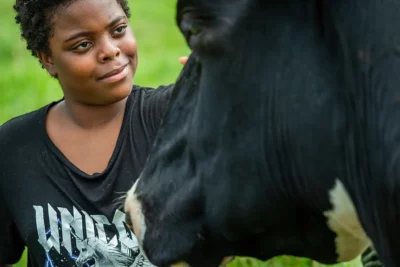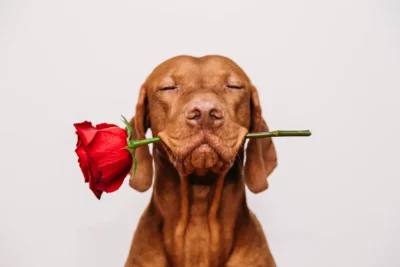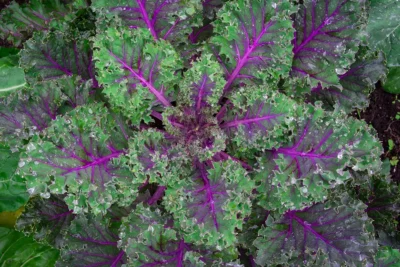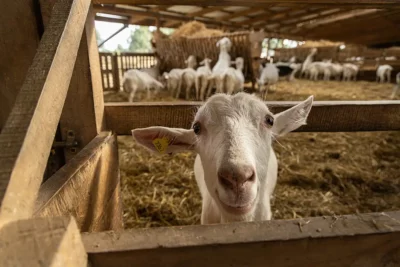There is much that connects different social justice movements, from the systems of oppression that give rise to injustices to the campaign tools used to combat them. Here, we talk about one specific connection, that between veganism and reproductive justice.
What Is Reproductive Justice?
According to Birth Companions, reproductive justice is a “rights-based framework and an intersectional feminist activist movement bringing together reproductive rights and social justice”. It was developed 30 years ago by women of color who recognized that the existing movement did not address the full range of reproductive experiences and issues faced by marginalized communities. Sister Song collective was central to creating this new framework and remains at the forefront of reproductive justice advocacy today.
Their 2023 Declaration states:
“We choose us. We invoke the spirit of our ancestors who cleared the path for us, the comrades who fight alongside us today, and those who will fight beyond us, who will become our greatest dreams. We reclaim the demands of Reproductive Justice that our Black foremothers named nearly 30 years ago:
- The human right to own our bodies and control our future
- The human right to have children
- The human right to not have children, and
- The human right to parent the children we have in safe and sustainable communities.”
What Is Veganism?
The Vegan Society, whose founder coined the word “veganism” defines it as “a philosophy and way of living which seeks to exclude — as far as is possible and practicable — all forms of exploitation of, and cruelty to, animals.”
This goes beyond the narrower definition often ascribed to it, namely that vegans eat only animal-free foods. We do! But that is just the start. Veganism is a way of living that defines our choice of foods, clothes, toiletries, cosmetics, household items, car interiors, and so much more, to ensure they are free from all animal products. Being vegan also extends to our entertainment and hobbies, as we will not fund zoos and aquariums that hold animals captive, nor circuses or rodeos, or any other “attractions’’ that exploit and harm animals.
What Connects Reproductive Justice and Veganism?
To answer that, we first need to consider a prejudice shared by most of the human population: speciesism. That is the bias for or against different species, which almost always regards the human animal as the most important and morally worthy, with all other animals perceived as inferior, often on a sliding scale of worth. This system of prejudice is all around us and it is within most of us. It legitimizes, and even justifies, the infliction of appalling physical, psychological, and emotional harms onto animals in the name of food production, “pest” control, “sport”, and medical experimentation. If you believe — as we do — that animals are here with us, not for us, you will immediately see why we oppose and seek to dismantle this human-topped hierarchy.
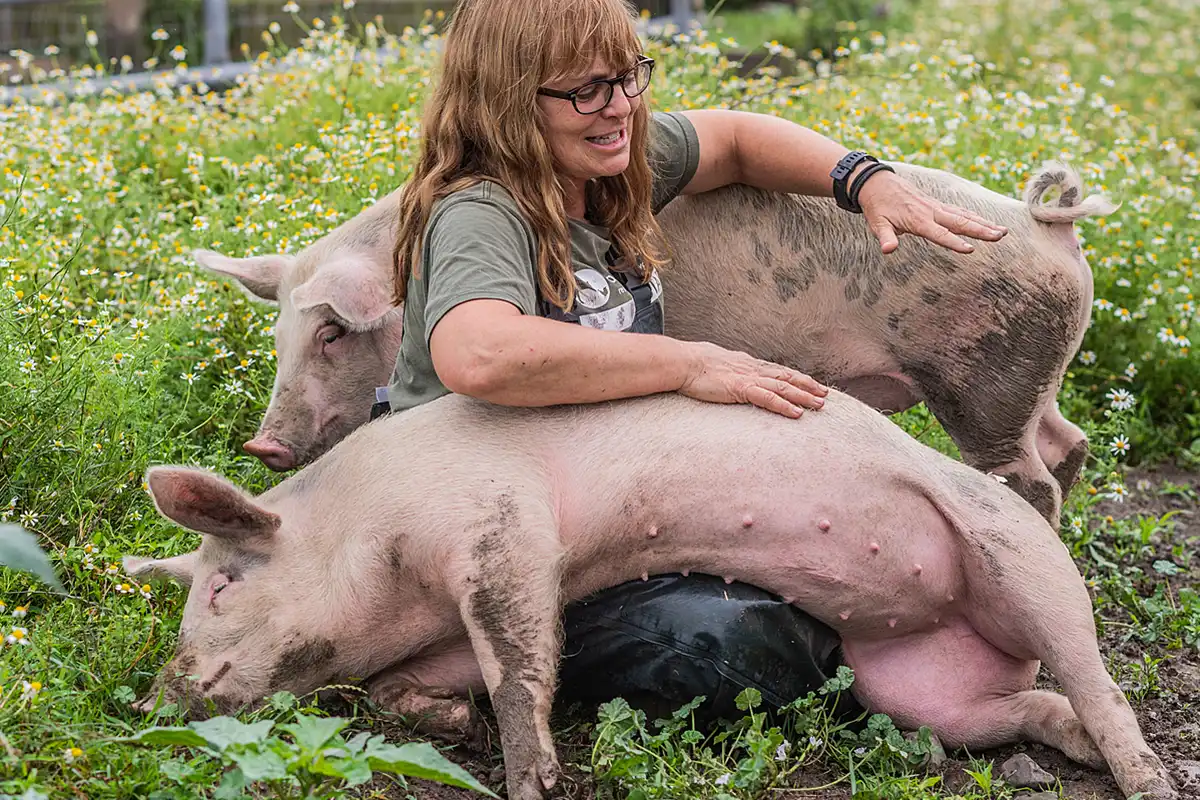
Hierarchies Create Oppression for People and Animals
Hierarchical structures that place a select group of individuals at the top of the social system and other individuals or groups lower down, foster inequity, oppression, hatred, and injustice.
When we recognize speciesism as yet another way of denying worth to living beings, we can see that both people and animals have been victims of these systemic oppressions for millennia.
Reproductive Justice and Veganism
Naturally, animals choose their mate, build a nest or a den, and give birth to their young whom they nurture and love. On farms, all of these natural instincts are denied them. The entire farming industry relies on exploiting the reproductive capacities of animals until those animals physically and emotionally break down. Mothers are repeatedly and forcibly impregnated — often artificially, sometimes even surgically — and are forced to birth animals who are immediately taken from them.
Ewes, Cows, and Sows
The meat we eat is actually the bodies of baby animals. Their mothers are likely incarcerated inside factory farms, as that is the norm of meat production. Trapped inside crates, cages, and pens, they have no control over their own bodies or their futures. They are not seen as having any inherent value. In fact, they are often not even seen as living beings, but rather baby-making, profit-generating machines. That means, once they can no longer produce sufficient babies to satisfy the demands of the industry, they are slaughtered. It is a shockingly callous way to treat other beings.
Egg-Laying Hens
The eggs we eat also rely on the reproductive capacities of female animals, this time chickens, (and sometimes ducks and geese). Naturally, hens choose a mate, and build a nest in which she lays her fertilized eggs. She sits on them, keeping them warm and safe, and as her young develop inside the shells, she speaks to them, and they to her. On farms, almost all egg-laying hens are packed into oppressive cages that cause intense stress and damage their feet. The hens never get the chance to sit on their eggs, which is a powerful natural instinct, and can only watch as their eggs roll away from them. Hens have been selectively bred to lay many more eggs than is natural or safe for them, which leads to weak bones and fractures. Once they can no longer lay the number of eggs the industry demands of them, these bright and inquisitive animals are slaughtered. They are just two years old when killed and have never enjoyed a moment of their lives.
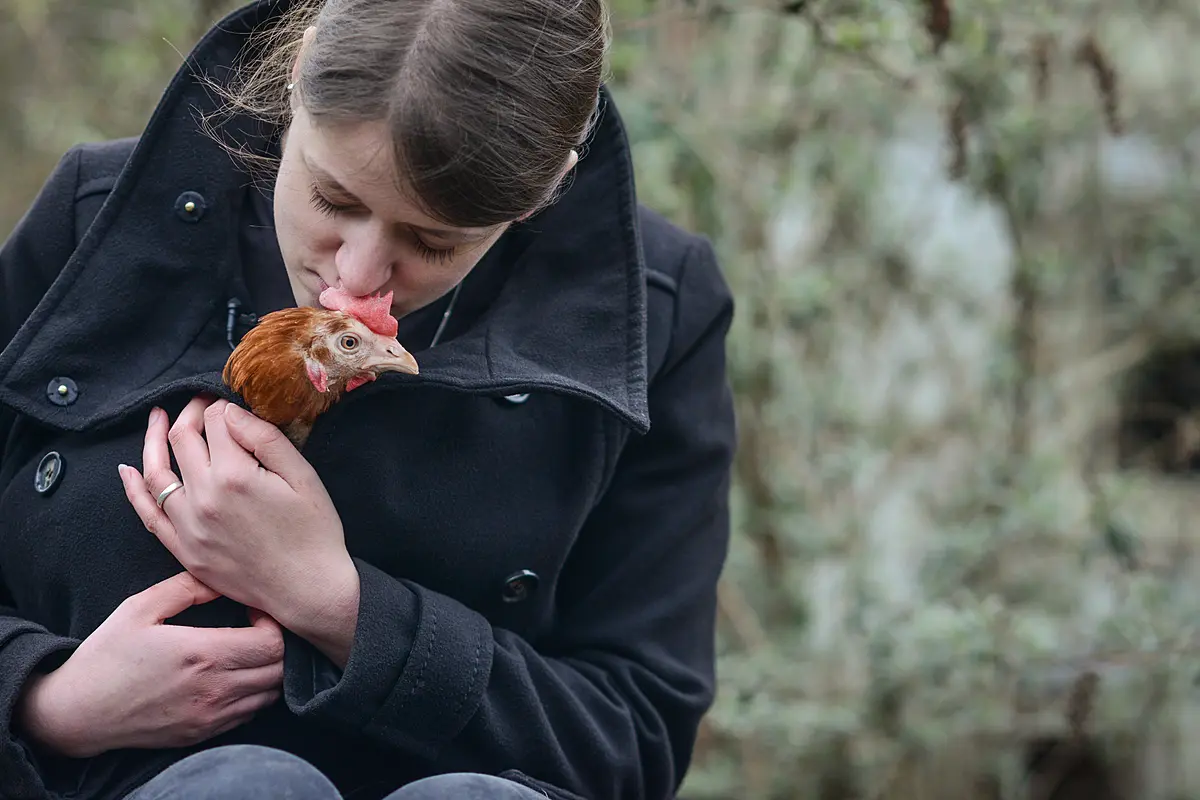
Dairy Cows
Milk is made by mothers to feed their young. Cows — like all mammals, including humans — make milk only when they are pregnant or nursing. So, to keep the profitable milk coming,
cows are repeatedly impregnated. But profits would dwindle if the baby was actually allowed to drink her milk, so, calves are taken from their mothers soon after birth — a separation that is deeply distressing for both. Instead, the milk is pumped from the mother’s udders and sold for human consumption. The calf may be locked alone in a tiny hutch and reared for veal, or, if female, she may replace her exhausted mother in the dairy farm. Any calf whose body cannot be monetized is shot at birth.
Reproductive Justice for Male Animals
There is no good outcome for any farmed animal, but while our focus may be on female animals when we talk about reproductive justice, males are also exploited, harmed, and killed because of their reproductive capacities, or lack of the desired ones. Some males are kept for their sperm. This is taken from them forcibly, artificially, and often painfully. When their fertility declines, these animals are also deemed worthless and slaughtered.
Males born into the meat trade are killed and their bodies butchered into cuts of meat. But what happens to males born into the egg and dairy industries? There is a 50:50 chance that every chick hatched into the egg industry is male. They are of no use to the industry as they cannot lay eggs, and so billions of day-old male chicks are gassed, crushed, or macerated to death every year. Just so people can eat eggs.
Similarly, in the dairy industry, there is a 50:50 chance that the calf born will be male. Unable to produce milk, these are of no use to the dairy trade. They may be sold into the veal trade but if money cannot be made from their bodies, they too are killed at birth.
Is the fate of male calves and chicks worse than that of their sisters who have years of suffering and exploitation ahead of them? We find it impossible to say.
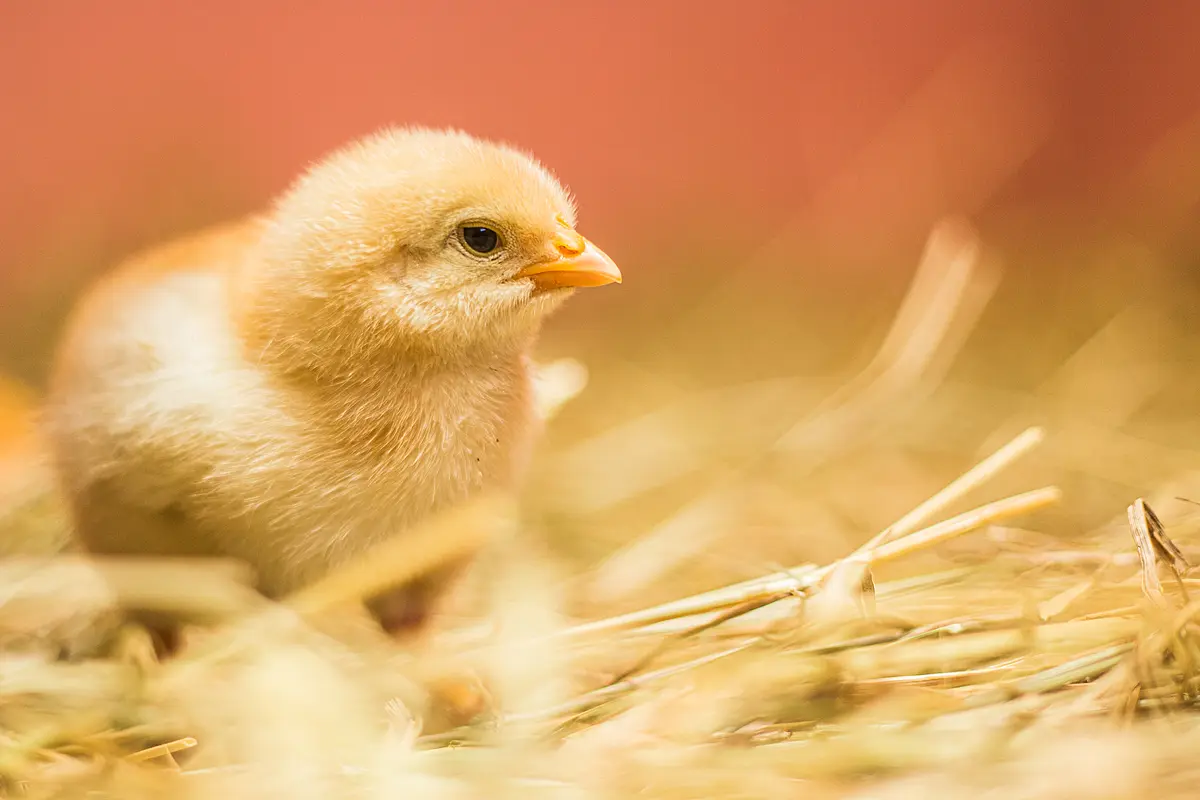
Conclusion
If you believe that animals have inherent rights, including over their own bodies, then the connection between the foods we eat and reproductive justice becomes crystal clear. On farms, animals are denied the right to choose their own mate and when to breed. Their powerful instincts to nest and nurture are also denied them but, perhaps most devastating of all, their babies are taken away from them.
The physical suffering caused to animals by the meat, dairy, and egg industries is beyond comprehensible, but the emotional and psychological damage inflicted on them is another wave of injustice.
Whether you are working to dismantle the hierarchies that justify the oppression and persecution of living beings, or simply believe that mothers should be allowed to care for their young, we invite you to step away from these exploitative industries and try vegan with us.
